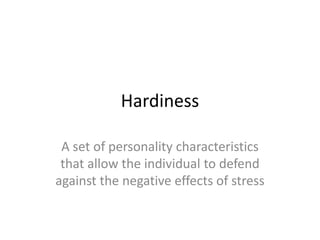
Kobasa's Research into the Hardy Personality
- 1. Hardiness A set of personality characteristics that allow the individual to defend against the negative effects of stress
- 2. The 3 C’s of hardiness Control • Strong sense of control over events in their life, can overcome their experiences Commitment • Highly committed and involved in tasks, strong sense of purpose Challenge • View life events as challenges to overcome – change is an opportunity for development
- 3. Research into the ‘hardy’ personality Aim: To investigate whether a ‘hardy’ personality impacts on an individuals ability to defend against the negative effects of stress Procedure: Kobasa studied 800 American business executives using the SRRS – 150 of these were identified as having high stress levels, some with a low illness and other with a high illness record. There must be something different about these 2 groups Gave the 150 participants a hardiness questionnaire
- 4. Research into the ‘hardy’ personality Findings: • High stress/low illness participants scored highly on all 3 characteristics of hardiness • High stress/high illness scored much lower • Suggesting that the hardy personality type is linked to stress levels and that hardiness defends against the negative effects of stress! Conclusion: Kobasa concluded the ‘hardy’ personality encourages resilience and helps an individual to cope with stress
- 5. Hardiness A02 P • Further evidence supports Kobasa’s findings • e.g. Lifton et al (2006) found that low hardiness was E disproportionately represented amongst university drop-outs • This is a strength because it supports Kobasa’s findings E that a person scoring highly for hardiness is more successful in coping with stress
- 6. Hardiness A02 • Kobasa’s research relied on self-report P methods • e.g. Some participants might provide false E information in an attempt to appear more stressed/relaxed in response to social desirability • This is a weakness because the study may not E actually be measuring what it intends to, the research has low internal validity
- 7. Hardiness A02 P • Kobasa’s research could be affected by a third variable • e.g. ‘hardy’ people might exercise the control E element of their personality to ensure they have relaxation time to offset the stress • This is a weakness because the relationship between E hardiness and someone's ability to cope with stress might not be a direct as first assumed